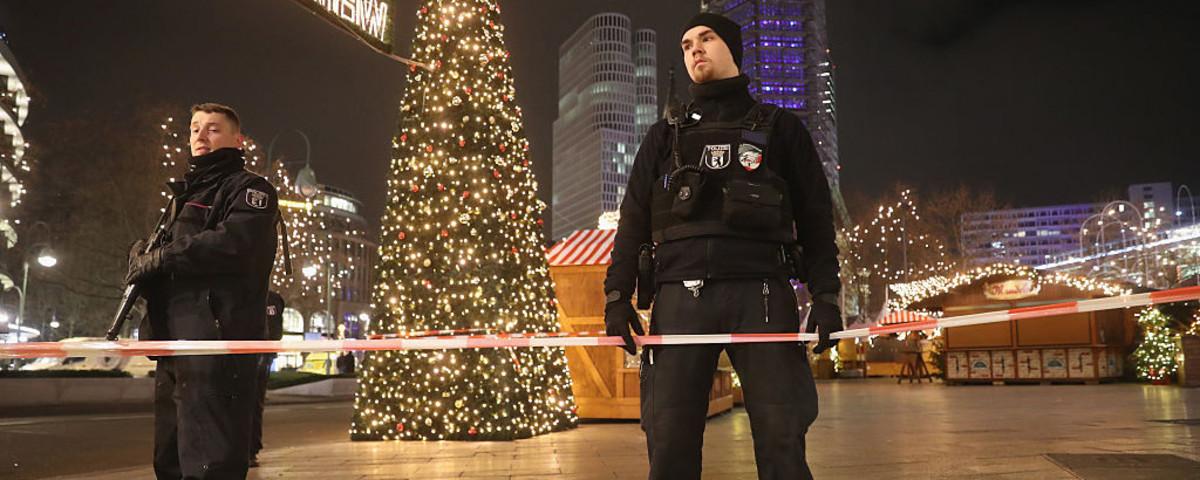The terrorist group finds Germany a particularly promising target for its slaughter.
This afternoon, Daesh (also known as ISIS and the Islamic State) announced that a “soldier” of its banner was responsible for yesterday’s attack in Berlin. In that incident, an individual drove a truck into a crowded Christmas market. He took twelve innocent lives and wounded 42 others. He also frayed Germany’s Christmas spirit.
In European counterterrorism circles, there’s little surprise that this attack occurred. While all of Europe faces a severe threat from Daesh, Germany has been particularly vulnerable for three reasons.
First, Germany’s domestic intelligence service, the BfV, is overwhelmed. Today, in addition to monitoring thousands of German Salafi extremists, the BfV must also monitor thousands of other suspected extremists. This is because Angela Merkel welcomed 1 million migrants and refugees into Germany in 2015. It was an act of extraordinary generosity, but it also threw a curveball at German intelligence services.
For one, Daesh uses migrant flows as cover to help its officers infiltrate Europe. This summer, after a foiled Daesh plot against Germany, I explained the particular challenge that Daesh poses for counterterrorism services. Relying on encrypted-messaging platforms, robust logistics networks, and impressive operational-security tactics, each credible Daesh suspect — whether directed or inspired — requires human intensive physical surveillance. That takes a team of over 20 people in a 24-hour period. And while the BfV relies on support from federal and local German law enforcement, it has only around 2,500 employees, many of whom are not intelligence officers.
Moreover, BfV is also responsible for counter-intelligence operations against Russia, among other states, and a number of additional national security endeavors. The Russians like to waste as much as test the resources of Western intelligence services (probably in order to facilitate attacks on the West). Regardless, the BfV doesn’t have nearly enough professionals at its disposal.
Second, Germany’s porous continental borders make it an easy target. Unlike the U.K. — which is somewhat protected by the English Channel — Germany’s borders with nine different nations offer Daesh multiple infiltration routes. But those borders also mean that the group can prepare attacks outside Germany and then infiltrate later with mitigated risk. Although we’re still analyzing the Berlin attack, it appears to have been carried out in this manner. It seems that the attacker murdered a Polish truck driver in Poland and then stole his truck. He probably knew that he could easily cross the German border but that a murder and robbery in Germany would draw the immediate attention of German authorities.
Third, Germany offers Daesh what it most desires in Europe — namely, sectarian chaos. As a highly successful Western economy home to diverse peoples (a large Kurdish population, for example), Germany is a banner for everything Daesh detests. And that points to something Daesh’s broader strategy of manipulating European political tensions.
Consider that a recurring theme of Daesh attacks in Europe (especially those with a connection to Syria) has been their effort to whip up public anger. While the deliberate and widespread bloodletting in the Paris attacks best illustrates that intent, other attacks also fit the mold. Take July’s single-casualty attack targeting a French Catholic priest. Such attacks prove that Daesh is not content simply to anger European populations; it wants to inspire reprisals against Muslims. Other foiled plots also attest to this intent. But the key is this: Daesh believes that if it can spark sectarian chaos in the West, it will increase its own support, reach, and military power.
Daesh is trying to echo in the West what has worked so well for them in Iraq and Syria, where relentless targeting of Shia Muslim has led to the reprisal slaughter of Sunni Muslims. Those reprisals in turn draw new Sunni recruits into Daesh’s ranks. In the West, Daesh wants Christians and secularists to accost Muslims on the street and drive them into extremism.
Unfortunately, while Germany understands this reality, its response is flawed. Contemplate the BfV’s short public primer on Daesh. It warns that “publishing, fostering, or tolerating Islam-critical behavior (e.g., bans on wearing full-body veils, caricaturing the founder of Islam, Muhammad, bans on construction of minarets, or disrespectful handling of religious writings) continue to be important criteria regarding the threat posed to individual states.” On paper, this call for toleration seems credible, but it’s misguided. When we in Western societies bend our values, we broadcast weakness to an enemy that already detests us. And weakness is blood in the Islamist-extremist water. Yes, diversity is one of our strengths, but as I once told Pat Buchanan, only when bound to unyielding values.
Regardless, let us pray that German authorities capture this attack cell (whether it is one individual or many) before another attack occurs. And let us also be confident but aware. Daesh has other cells in Europe, and it has a particular fetish for targeting holiday events. This enemy may be losing territory, but its threat is far from over.
NOTE: Some ask me why I refer to ISIS as Daesh. Here’s why. First, it has nothing to do with President Obama’s delusional reluctance to identify the roots of Salafi-Jihadism in Islamic extremism. Instead, I refer to “Daesh” at the request of an individual who was intimately — and physically — involved in the fight against Daesh’s precursor organization, al-Qaeda in Iraq. That individual convinced me that describing ISIS as Daesh is to show solidarity with U.S. Muslim allies — specifically, allies such as Jordan, whose warriors risk life, limb, and brain to support U.S. counter-terrorism interests.
— Tom Rogan writes for National Review Online and Opportunity Lives. A former panelist on The McLaughlin Group, he is a senior fellow at the Steamboat Institute. He tweets @TomRTweets and his homepage is tomroganthinks.com.

No comments:
Post a Comment